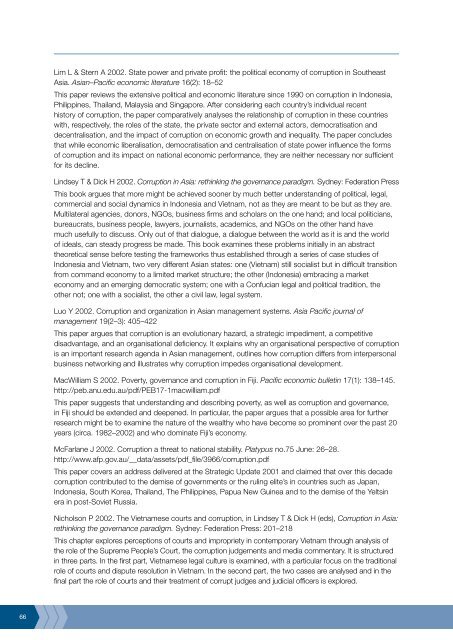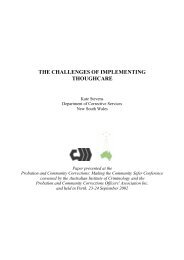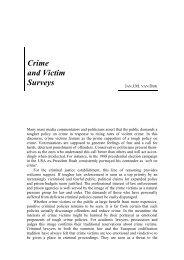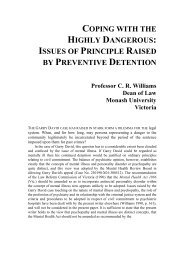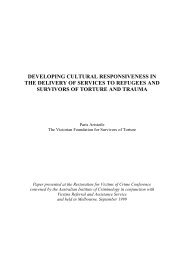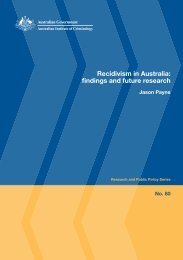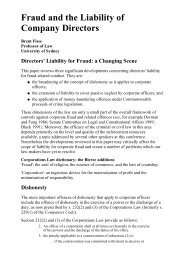Review of anti-corruption strategies Rob McCusker - Australian ...
Review of anti-corruption strategies Rob McCusker - Australian ...
Review of anti-corruption strategies Rob McCusker - Australian ...
You also want an ePaper? Increase the reach of your titles
YUMPU automatically turns print PDFs into web optimized ePapers that Google loves.
Lim L & Stern A 2002. State power and private pr<strong>of</strong>it: the political economy <strong>of</strong> <strong>corruption</strong> in Southeast<br />
Asia. Asian–Pacific economic literature 16(2): 18–52<br />
This paper reviews the extensive political and economic literature since 1990 on <strong>corruption</strong> in Indonesia,<br />
Philippines, Thailand, Malaysia and Singapore. After considering each country’s individual recent<br />
history <strong>of</strong> <strong>corruption</strong>, the paper comparatively analyses the relationship <strong>of</strong> <strong>corruption</strong> in these countries<br />
with, respectively, the roles <strong>of</strong> the state, the private sector and external actors, democratisation and<br />
decentralisation, and the impact <strong>of</strong> <strong>corruption</strong> on economic growth and inequality. The paper concludes<br />
that while economic liberalisation, democratisation and centralisation <strong>of</strong> state power influence the forms<br />
<strong>of</strong> <strong>corruption</strong> and its impact on national economic performance, they are neither necessary nor sufficient<br />
for its decline.<br />
Lindsey T & Dick H 2002. Corruption in Asia: rethinking the governance paradigm. Sydney: Federation Press<br />
This book argues that more might be achieved sooner by much better understanding <strong>of</strong> political, legal,<br />
commercial and social dynamics in Indonesia and Vietnam, not as they are meant to be but as they are.<br />
Multilateral agencies, donors, NGOs, business firms and scholars on the one hand; and local politicians,<br />
bureaucrats, business people, lawyers, journalists, academics, and NGOs on the other hand have<br />
much usefully to discuss. Only out <strong>of</strong> that dialogue, a dialogue between the world as it is and the world<br />
<strong>of</strong> ideals, can steady progress be made. This book examines these problems initially in an abstract<br />
theoretical sense before testing the frameworks thus established through a series <strong>of</strong> case studies <strong>of</strong><br />
Indonesia and Vietnam, two very different Asian states: one (Vietnam) still socialist but in difficult transition<br />
from command economy to a limited market structure; the other (Indonesia) embracing a market<br />
economy and an emerging democratic system; one with a Confucian legal and political tradition, the<br />
other not; one with a socialist, the other a civil law, legal system.<br />
Luo Y 2002. Corruption and organization in Asian management systems. Asia Pacific journal <strong>of</strong><br />
management 19(2–3): 405–422<br />
This paper argues that <strong>corruption</strong> is an evolutionary hazard, a strategic impediment, a competitive<br />
disadvantage, and an organisational deficiency. It explains why an organisational perspective <strong>of</strong> <strong>corruption</strong><br />
is an important research agenda in Asian management, outlines how <strong>corruption</strong> differs from interpersonal<br />
business networking and illustrates why <strong>corruption</strong> impedes organisational development.<br />
MacWilliam S 2002. Poverty, governance and <strong>corruption</strong> in Fiji. Pacific economic bulletin 17(1): 138–145.<br />
http://peb.anu.edu.au/pdf/PEB17-1macwilliam.pdf<br />
This paper suggests that understanding and describing poverty, as well as <strong>corruption</strong> and governance,<br />
in Fiji should be extended and deepened. In particular, the paper argues that a possible area for further<br />
research might be to examine the nature <strong>of</strong> the wealthy who have become so prominent over the past 20<br />
years (circa. 1982–2002) and who dominate Fiji’s economy.<br />
McFarlane J 2002. Corruption a threat to national stability. Platypus no.75 June: 26–28.<br />
http://www.afp.gov.au/__data/assets/pdf_file/3966/<strong>corruption</strong>.pdf<br />
This paper covers an address delivered at the Strategic Update 2001 and claimed that over this decade<br />
<strong>corruption</strong> contributed to the demise <strong>of</strong> governments or the ruling elite’s in countries such as Japan,<br />
Indonesia, South Korea, Thailand, The Philippines, Papua New Guinea and to the demise <strong>of</strong> the Yeltsin<br />
era in post-Soviet Russia.<br />
Nicholson P 2002. The Vietnamese courts and <strong>corruption</strong>, in Lindsey T & Dick H (eds), Corruption in Asia:<br />
rethinking the governance paradigm. Sydney: Federation Press: 201–218<br />
This chapter explores perceptions <strong>of</strong> courts and impropriety in contemporary Vietnam through analysis <strong>of</strong><br />
the role <strong>of</strong> the Supreme People’s Court, the <strong>corruption</strong> judgements and media commentary. It is structured<br />
in three parts. In the first part, Vietnamese legal culture is examined, with a particular focus on the traditional<br />
role <strong>of</strong> courts and dispute resolution in Vietnam. In the second part, the two cases are analysed and in the<br />
final part the role <strong>of</strong> courts and their treatment <strong>of</strong> corrupt judges and judicial <strong>of</strong>ficers is explored.


